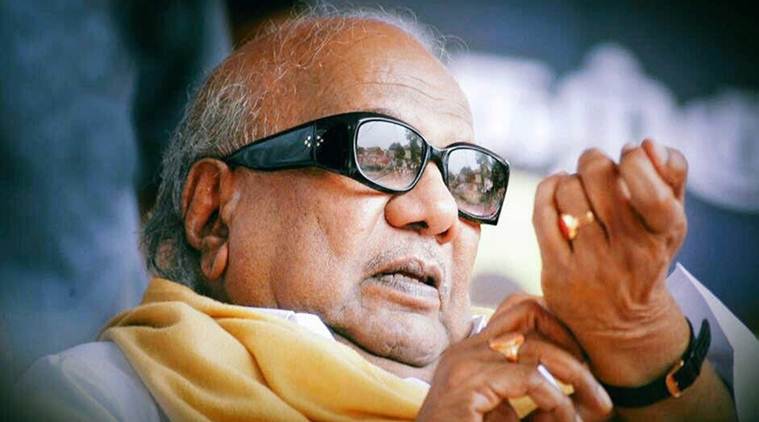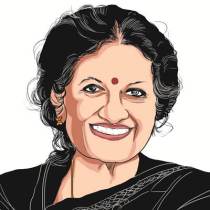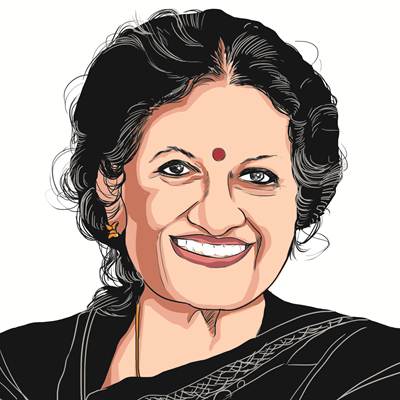M Karunanidhi: Democrat and patriarch
Karunanidhi was a mass leader, and a politician’s politician.

For more than 50 years, Karunanidhi’s position as the party supremo was undisputed.
The cadres crowd the streets, eyes brimming with tears and heart heavy with grief. He was ailing for a long time, his voice had gone mute for a couple of years now, and he was past 94. Yet they cannot believe that the patriarch is no more. He would address the crowd with words full of warmth: En uyirukkum uyiraana udanpirappukkale (my brethren, who are dearer to me than life itself) and they would roar back, “we are here for you thalaiva (leader), forever!” All the founders of the Dravida Munnetra Kazhagam (DMK) had left for the beyond, he stayed on and the cadres felt there was no death for him.
For more than 50 years, Karunanidhi’s position as the party supremo was undisputed. Born on June 3, 1924, in Thirukkuvalai village, Thanjavur district, to Muthuvelar and Anjugam who belonged to the “isai vellalar” community “of ordinary peasant stock”, Karunanidhi was exposed to the inequalities and brutalities of a caste-based hierarchy from his childhood. He naturally identified himself with the underdog.
Circumstances did not permit him to study beyond class five, but he acquired proficiency in Tamil and became a successful script-writer. He joined the campaign against Hindi at the age of 13, cut his hand and wrote “Tamizh vaazhga” (Long live Tamil) on the walls in his blood. He gravitated towards politics when he came under the spell of Periyar E V Ramasamy, the founder of the Self-Respect Movement and the Dravida Kazhagam. He revered Periyar and organised the students’ wing of the DK. He soon began to look after Periyar’s magazine, Kudi Arasu. When C N Annadurai, another ardent admirer and disciple of Periyar, broke off from the mentor who was against electoral politics, Karunanidhi followed him. Anna founded the DMK, and Karunanidhi rallied to his banner and played a vital role in its growth as a powerful alternative to the Congress in Tamil Nadu. Like Annadurai, Karunanidhi mastered the art of oratory and became a very successful journalist.
The 1950s were the heady days of protest by the DMK against the Brahmin hegemony in Tamil Nadu. The silver screen became an invincible weapon in the hands of Anna who deftly used two youngsters, Karunanidhi and M G Ramachandran (MGR). While MGR was the swash-buckling hero on the screen, Karunanidhi with his rabble-rousing scripts was the real power behind the show. Listen to the dialogues that Karunanidhi penned for Shivaji Ganesan in the film Parasakthi. Brahmin bashing was never fiercer as it cuts through every syllable and every pause that was so forcefully expressed by the veteran actor. The film was a runaway success and Karunanidhi became instantly famous. He became “Kalaignar”, the artist, from then on.
A born fighter, he showed signs of leadership early in his political career. He was in the forefront of all the agitations organised by the DMK and courted imprisonment several times. He created a big stir during the agitation to change the name of Dalmiapuram to the original Tamil name Kallakkudi, by laying himself on the railway track with the words “udal mannukku uyir tamizhukku” (the body for the land and life for Tamil) declaring he would rather give up his life than suffer humiliation caused to Tamil Nadu.
As a trusted lieutenant to Annadurai, he was given a berth in the first DMK ministry and he creditably held the portfolios of public works and transport. He was the author of the plan for the nationalisation of bus transport in the state. MGR played a major role in garnering support for Karunanidhi during the succession battle after Annadurai’s death in 1969 and also in helping the party to its electoral success in 1971. But MGR became a cause for worry. His popularity was growing at an astonishing speed. After the 1971 elections, he had also become a member of the legislative assembly besides being treasurer of the party. And he seemed disgruntled and was prone to ask too many questions. While it was easy to effectively undercut others, this man’s appeal and mass base made him a formidable rival.
The DMK executive, loyal to Karunanidhi, expelled MGR from the party for indiscipline. For all his political shrewdness, Karunanidhi did not realise that his hasty act would change the political landscape of Tamil Nadu to his regret. One week after his expulsion, on October 18, 1972, MGR announced the formation of a new political party, Anna Dravida Munnetra Kazhagam.
When Indira Gandhi declared Emergency, it became easier for MGR to push for the dismissal of the government of Karunanidhi, who openly protested the imposition of Emergency. Karunanidhi would not have imagined at that time that after the dismissal he would be left in a political limbo for 13 years. MGR seemed indestructible till his death.
But the MGR legacy remained to torment. MGR’s protégé, J Jayalalithaa, had taken over the mantle forever, posing a threat to his future plans for the party and also the political future of his son, M K Stalin. It became an epic fight between two unequal partners. When Jayalalithaa won power in 2001, a great fear seized the DMK. Jayalalithaa was sent to jail by thalaivar. Now the witch-hunt would begin. And so it was. There was the spectacle of Karunanidhi being dragged off, without even an arrest warrant. The heart-rending cries of the 75-year-old man shook the country.
But the MGR legacy remained to torment. MGR’s protégé, J Jayalalithaa, had taken over the mantle forever, posing a threat to his future plans for the party and also the political future of his son, M K Stalin. It became an epic fight between two unequal partners. When Jayalalithaa won power in 2001, a great fear seized the DMK. Jayalalithaa was sent to jail by thalaivar. Now the witch-hunt would begin. And so it was. There was the spectacle of Karunanidhi being dragged off, without even an arrest warrant. The heart-rending cries of the 75-year-old man shook the country.
Karunanidhi could opt for political expediency to defeat Jayalalithaa and befriend the BJP whose philosophy was at odds with the DMK. He could come out of it sensing the party’s discomfort. His long innings in the party and his statesmanship in dealing with national politics won him respect and political credibility. He silently bore the humiliation he suffered when the party was shamed by the 2G-spectrum controversy and watched with immense pain his daughter Kanimozhi sent to jail. When the court declared the guilt could not be proved, he was not in a position to even express relief. He mellowed, became even philosophical, penning a play on Ramanujar, the 11th century Hindu philosopher.
The writer is a Tamil writer and biographer of J Jayalalithaa
For all the latest Opinion News, download Indian Express App
More From Vaasanthi
- Tamil Nadu politics: New messiahs, and how they are different from the oldJ Jayalalithaa, an actor who paired with MGR in a number of films, was looked upon as his political heir, and the voters of MGR…
- Gained in Translation: On Padmavati, a Kannaki cueTamil women will gladly give a piece of advice to their Rajasthan sisters. Hey, beware of myths. They are nothing but old feudal traps to…
- J Jayalalithaa (1948-2016): ‘I stand before you, having come to this point, swimming in the river of fire’People never got to know her. Or have the courage and grit with which she had to wade through in her 68 years of turbulent…












































No hay comentarios:
Publicar un comentario